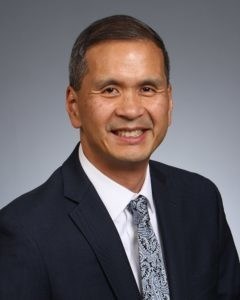"I'm grateful to our people for the resiliency and clinical, technological and operational expertise they have demonstrated during a time of tremendous change," said Dr. Davidoff who, with Dr. Ansari, was 77th on the list. "This honor also celebrates the practice of Permanente Medicine, an approach that's committed to delivering personalized, high-quality care to patients based on the best evidence and research and enabled by technology."
Dr. Davidoff serves as executive medical director and chair of the board of the Southern California Permanente Medical Group (SCPMG). SCPMG consists of more than 8,100 physicians caring for more than 4.8 million Kaiser Permanente members. He is also chair of the board and CEO of The Southeast Permanente Medical Group and chair of the board and CEO of the Hawaii Permanente Medical Group.
As leaders of The Permanente Federation, Drs. Davidoff and Ansari guide nearly 24,000 physicians and 80,000 clinicians, nurses and staff who serve Kaiser Permanente's 12.6 million members. They provide strategic direction to the physician-led medical groups and work closely with the Kaiser Foundation Health Plan and Hospitals to lead Kaiser Permanente's national strategy.
"This recognition honors the innovative efforts of our Permanente physicians, clinicians, nurses and staff to advance patient-centered care and create an environment where people can do their best work," said Dr. Ansari. "I am humbled by the extraordinary commitment everyone continues to model during this time of significant change in health care."
Dr. Ansari is also CEO and executive director of The Permanente Medical Group and president and CEO of Mid-Atlantic Permanente Medical Group. Their more than 11,000 physicians and 45,000 staff care for approximately 5.4 million Kaiser Permanente members in Northern California, Maryland, Virginia and Washington, D.C.
Permanente Medical Groups are leveraging technology and other innovations to address the changing needs and expectations of patients through transformational health care innovations, which include:
- Advanced Care at Home programs that enable Kaiser Permanente members with certain acute care needs that typically would require hospitalizations to instead receive care in the comfort of their own homes. Telehealth and remote patient monitoring are among the technology-based capabilities that enable safe management of patients at home.
- Augmented intelligence (AI), an exciting new area that includes the use of machine learning, natural language processing and other AI-enabled tools to assist and improve the patient and clinician experience. For example:
- AI and machine learning have shown promise in early warning systems that analyze hospital patients' data to identify when patients are at risk of serious decline and may need intervention.
- Computer vision technology can analyze medical images for tumors, cancers and surgical guidance.
- Data, telehealth, AI and machine learning can also be harnessed to streamline workflow. These tools can help with charting in the electronic medical record and managing the physicians' in-basket, enabling physicians to spend more face-to-face time with patients and less time on administrative tasks.
- Preventive screening measures for breast cancer, cervical cancer and colorectal cancer, as well as for controlling blood pressure and managing diabetes. These measures have put Kaiser Permanente in the top 5% to 10% nationally on key preventive care measures tracked by HEDIS® (Healthcare Effectiveness Data and Information Set).
- Advances in health equity through preventive measures. For example, a recent study published in JAMA highlighted a Kaiser Permanente Southern California quality improvement program that included strategies around building trust and integrating culturally tailored communication tools that helped to reduce disparities in blood pressure control between Black and white patients. Another study published in The New England Journal of Medicine showed that Kaiser Permanente Northern California has essentially eliminated the colorectal cancer disparity between Black and white adults through preventive screening.
Also named to the 2023 "100 Most influential People in Healthcare" list is Greg A. Adams (10th), chair and CEO, Kaiser Foundation Health Plan and Hospitals.
The complete list of honorees and their profiles are available at 100 Most Influential People in Healthcare - 2023 | Modern Healthcare and in the December 4 issue of Modern Healthcare magazine. A digital subscription is required to view the online profiles.
To learn more about Permanente Medicine, visit permanente.org.
About Permanente Medical Groups
The Permanente Medical Groups are self-governed, physician-led, prepaid, multispecialty medical groups composed of nearly 24,000 physicians. We are dedicated to the mission of improving the health of our patients and communities. Together with the Kaiser Foundation Health Plans and Kaiser Foundation Hospitals, we are Kaiser Permanente — an award-winning health care system that delivers Permanente Medicine, care that is person- and family-centered, compassionate, evidence-based, technology-enabled, culturally responsive, team-delivered and physician-led, to 12.6 million Kaiser Permanente members. We work collaboratively, enabled by state-of-the art facilities and technology, to provide world-class preventive and complex care centered in eight states — from Hawaii to Maryland — and the District of Columbia.
About The Permanente Federation
The Permanente Federation LLC is the national leadership and consulting organization for the Permanente Medical Groups, which, together with the Kaiser Foundation Health Plans and Kaiser Foundation Hospitals, comprise Kaiser Permanente. The Federation works on behalf of the Permanente Medical Groups to optimize care delivery and spread Permanente Medicine — care that is person- and family-centered, compassionate, evidence-based, technology-enabled, culturally responsive, team-delivered and physician-led. The Federation, based in Oakland, California, fosters an open learning environment and accelerates research, innovation, and performance improvements across the Permanente Medical Groups to expand the reach of Kaiser Permanente's integrated care delivery model and to lead the nation in transforming health care delivery.
SOURCE The Permanente Federation








Share this article